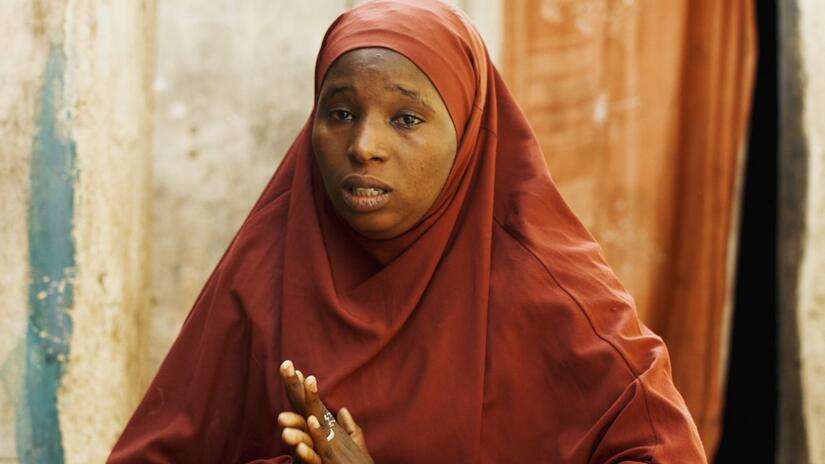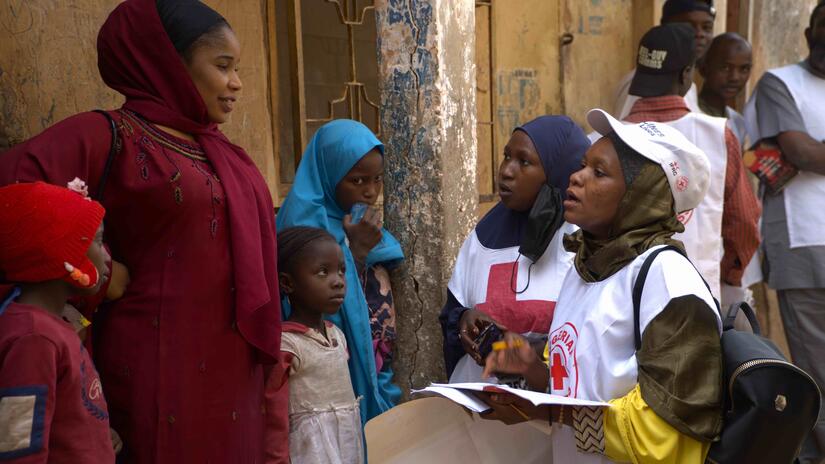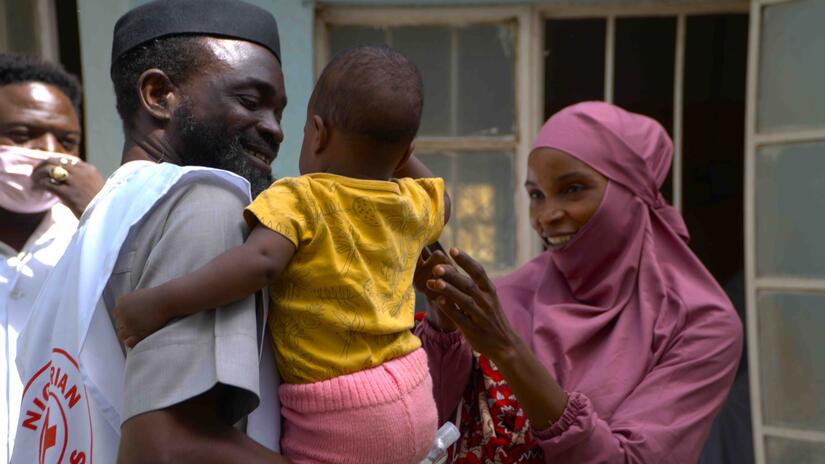By Ene Abba/IFRC
When Red Cross volunteers came to her neighborhood, distributing flyers and sensitizing residents about diphtheria Aisha Adam Ibrahim did not take them seriously at first.
"I was dismissive at first when the Red Cross volunteers brought the information on diphtheria to our doorstep,” she says. “But that knowledge saved my life."
When Aisha fell ill, those information sharing sessions played a crucial role, says Ibrahim, who lives with her extended family in Ungogo community in Kano state. Recognizing the symptoms early, she sought medical help promptly, potentially saving her life.
Since December 2022, diphtheria has been spreading across Nigeria, posing a community-wide challenge. Communal living, close-knit neighbourhoods, and shared spaces play a big role both in how this outbreak is spreading and its mitigation.
Kano state, with its large diverse population and unique architectural landscape, faces distinctive challenges in combating the spread of this epidemic. As the epicentre of this crisis, Kano is where 80 per cent of all reported cases in Nigeria originate. With a large population compounded by the close-knit nature of the houses, diphtheria finds an easy transmission from person to person.
Aisha lives in such a close-knit neighbourhood, and as a primary school teacher interacts constantly with children in her community. Aisha encountered heartbreaking stories at the hospital where she was admitted for treatment.

Surraya Musa lost her two children to diphtheria and is now a vocal community advocate about the dangers of the outbreak. “I lost all my children," she says. "I don't want any parent to experience what I did."
Photo: Ene Abba/IFRC
One such grieving parent is Surraya Musa, who lost her only two children to diphtheria within a week. Surraya now dedicates herself to educating neighbours and communities about the severity of the outbreak, imploring parents to heed the advice of Red Cross Volunteers regarding vaccination and hygiene practices.
"I tell my neighbours to listen to what the Red Cross volunteers say,” she says. “I lost all my children, I don't want any parent to experience what I did."

The outbreak has mobilised many volunteers who go door-to-door to raise awareness and conduct case search and contact tracing.
Photo: Ene Abba/IFRC
New Red Cross volunteers Amina Abdullahi and Maryam Ibrahim are also advocates in their communities. Having gone through training, they actively participate in Risk Communication and Community Engagement (RCCE), active case searches, and contact tracing. Amina and Maryam express their fulfilment in supporting their community during this challenging time.
"Being part of the Red Cross allows me to make a difference. I feel responsible for protecting my community," says Amina.
Maryam adds: "It's a tough time for everyone, but seeing the impact we can make on people's lives makes it all worthwhile."
Red Cross Intervention
The severity of the outbreak prompted the Nigeria Red Cross Society (NRCS) to step in and collaborate with the government in March 2023. With a DREF allocation of CHF 430,654 from the IFRC, NRCS launched a multifaceted response. Over 4.9 million people have been reached through public health prevention, RCCE activities, and 760 volunteers trained in diphtheria prevention.
Meanwhile, more than 920,000 people have been mobilized for vaccination through 120 trained teams, and 1,915 suspected cases have been referred to health facilities through NRCS volunteers, as of early December 2023. As the outbreak gained momentum, IFRC has scaled up its diphtheria emergency appeal to 5.4 million CHF.

Salisu Garba, health coordinator for the Nigerian Red Cross in Kano state, says trust and community access enable the Red Cross to take effective actions, ensuring that diphtheria will be stopped as quickly as possible.
Photo: Ene Abba/IFRC
This support is what allows people such as Salisu Garba to continue the life-saving work. As health coordinator for NRCS in Kano, he walks through the communities and interacts with the locals in a manner that exudes familiarity with the street corners and the names of neighbourhood vendors. He highlights the critical role of close relationships with community leaders. This trust and access enable the Red Cross to take effective actions, ensuring that diphtheria will be stopped as quickly as possible.
"Our connection with communities allows us to reach more people effectively,” he says. “Together, we are working tirelessly to ensure that every person in Kano is informed, vaccinated, and protected from diphtheria."





